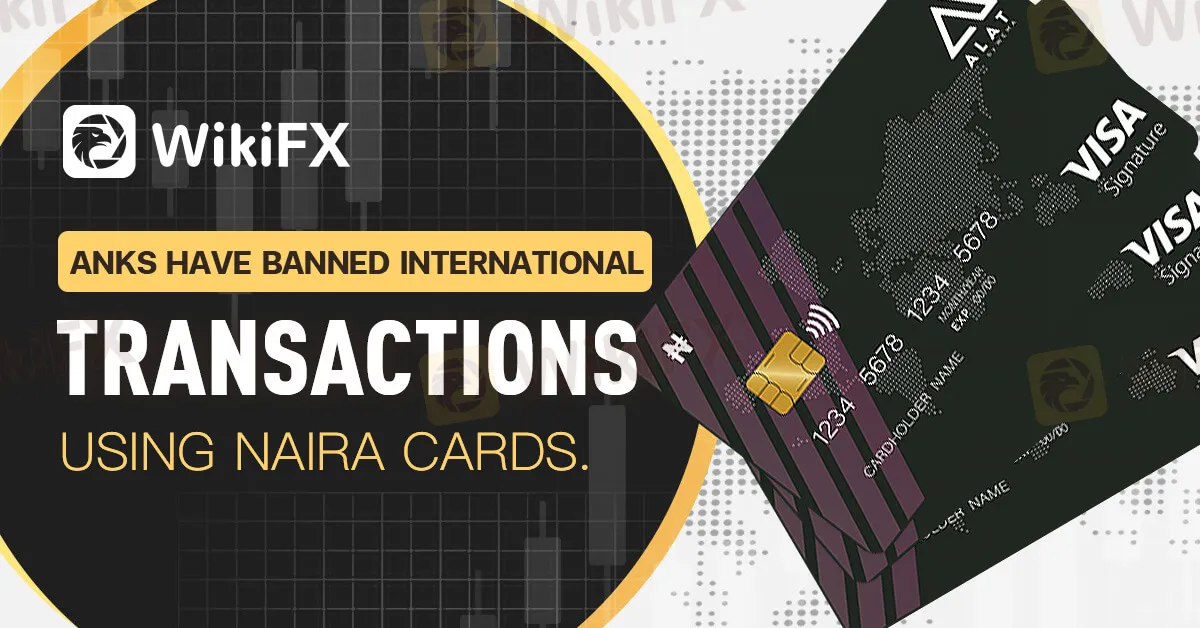简体中文
繁體中文
English
Pусский
日本語
ภาษาไทย
Tiếng Việt
Bahasa Indonesia
Español
हिन्दी
Filippiiniläinen
Français
Deutsch
Português
Türkçe
한국어
العربية
BANKS HAVE BANNED INTERNATIONAL TRANSACTIONS USING NAIRA CARDS.
Abstract:Naira cards will no longer be accepted for international online and Point of Sale (PoS) transactions, according to Nigerian banks, which would reduce the amount that customers using dollar cards may withdraw from foreign ATMs.

Naira cards will no longer be accepted for international online and Point of Sale (PoS) transactions, according to Nigerian banks, which would reduce the amount that customers using dollar cards may withdraw from foreign ATMs.
Customers of several banks have already been informed of the most recent development.
Starting on December 31, 2022, GTBank will no longer accept naira cards for online or point-of-sale transactions.
Customers were notified in a letter from GTCO that they would no longer be able to use their Naira Mastercard for international online and point-of-sale purchases as of December 31, 2022. You may fulfill all of your overseas spending needs using your GTBank dollar card.
This is closely related to the initiative to cut back on American spending abroad and conserve foreign currency for the economy.
On September 30, First Bank of Nigeria Limited banned all overseas transactions using its naira Mastercard.
You will no longer be able to use the Naira Mastercard, Naira Credit Card, our Virtual card, and Visa Prepaid Naira card for international transactions due to current foreign exchange market realities. According to First Bank, this will become effective on September 30, 2022.
In July, Standard Chartered Bank stopped allowing foreign purchases with its naira visa debit card.
Fintech companies have stopped offering virtual card services for cross-border transactions, along with Flutterwave, Eversend, and other fintech platforms.
In March, financial institutions cut the international spending limit on naira cards from $100 to $20 monthly.
Customers received an email from Zenith Bank Plc describing the new international payment plan. The usage of Zenith Bank Naira cards for international Automated Teller Machine (ATM) cash withdrawals and Point of Sale (PoS) transactions has been temporarily stopped, the bank announced.
In addition, the $100 monthly card spending cap for online purchases has been reduced to $20. In reaction to the economic realities of today, this review was written.
Customers of Stanbic IBTC Bank and Standard Chartered Bank Nigeria were urged to apply for dollar or sterling debit or credit cards if they wanted to do transactions with foreign currency.
Banks have, however, limited the total monthly amount of foreign exchange transactions that clients can make using their naira debit or credit cards at ATMs and Point of Sale (PoS) terminals abroad in recent months.
Findings revealed that certain banks had reduced their daily foreign ATM withdrawal limit from the $300 recommended by the Bankers Committee of the Central Bank of Nigeria to $100 because they were unable to find enough dollars to finance the transactions.
The indiscriminate and questionable ways in which some bank clients used their naira debit cards to make purchases abroad in dollars and other foreign currencies had already alarmed the Central Bank of Nigeria (CBN). The CBN had mandated that bank clients who exceeded the $50,000 annual forex limit it established would be implemented, and defaulters sanctioned. This was done to curb forex expenditure abroad.
The CBN also restricted importers carrying a variety of products access to the interbank currency market. The bank claimed that importers could no longer obtain hard currency to pay for 43 commodities, including toothpicks, grains, steel products, and private aircraft, in order to preserve its dollar reserves.
Additionally, customers using naira debit cards to pay foreign business partners are having their payment requests denied by banks.
They now request that payments made to clients abroad be made in the beneficiary's currency rather than in naira. The new process is different from the previous one, in which lenders debited client naira accounts at the current exchange rate and sent funds corresponding to the account of the offshore beneficiary in dollars.

Disclaimer:
The views in this article only represent the author's personal views, and do not constitute investment advice on this platform. This platform does not guarantee the accuracy, completeness and timeliness of the information in the article, and will not be liable for any loss caused by the use of or reliance on the information in the article.
Read more

Italian Regulator Warns Against 5 Websites
The Italian regulator, CONSOB has issued a warning against five websites offering unauthorized financial services. This regulatory action aims to protect the public from fraudulent activities.

FCA Identifies Clone Firm Exploiting Admiral Markets' Credibility
The UK Financial Conduct Authority (FCA) has issued a public warning regarding a fraudulent entity impersonating Admiral Markets, a legitimate and authorised trading firm. The clone firm, operating under the name Admiral EU Brokers and the domain Admiraleubrokerz.com, has been falsely presenting itself as an FCA-authorised business.

Malaysian Man Loses RM113,000 in Foreign Currency Investment Scam
A 57-year-old Malaysian man recently fell victim to a fraudulent foreign currency investment scheme, losing RM113,000 in the process. The case was reported to the Commercial Crime Investigation Division in Batu Pahat, which is now investigating the incident.

Broker Review: What is FXTM exactly? Is FXTM a Scam?
FXTM is a global forex broker founded in 2011. In today’s article, we are going to show you what FXTM looks like in 2024.
WikiFX Broker
Latest News
Hackers Charged for $11M Crypto Theft Using SIM-Swaps
Role of Central Banks in the FX Market
FCA Alerts Against Sydney FX
What Makes Cross-Border Payments Easier Than Ever?
Trader Exposes Unethical Practices by STP Trading
Malaysian Man Loses RM113,000 in Foreign Currency Investment Scam
Bitcoin Nears $100,000: A Triumph of Optimism or a Warning Sign?
Mastercard Partners with JPMorgan for B2B Cross-Border Payments
FCA Identifies Clone Firm Exploiting Admiral Markets' Credibility
Coinbase Under Scrutiny Amid Wrapped Bitcoin Delisting Controversy
Currency Calculator


